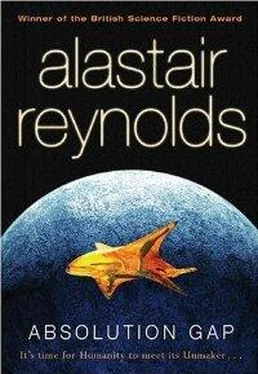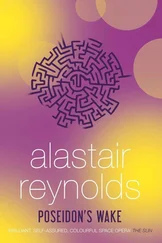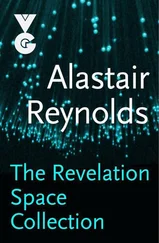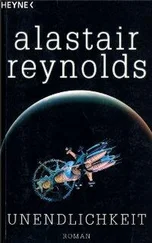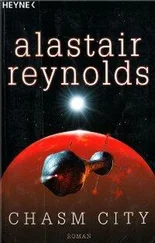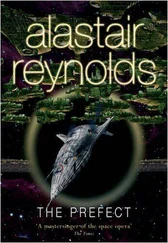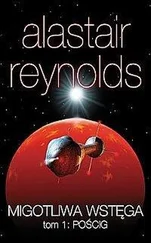Alastair Reynolds - Absolution Gap
Здесь есть возможность читать онлайн «Alastair Reynolds - Absolution Gap» весь текст электронной книги совершенно бесплатно (целиком полную версию без сокращений). В некоторых случаях можно слушать аудио, скачать через торрент в формате fb2 и присутствует краткое содержание. Год выпуска: 2003, ISBN: 2003, Издательство: Gollancz, Жанр: Фантастика и фэнтези, на английском языке. Описание произведения, (предисловие) а так же отзывы посетителей доступны на портале библиотеки ЛибКат.
- Название:Absolution Gap
- Автор:
- Издательство:Gollancz
- Жанр:
- Год:2003
- ISBN:0-575-07434-5
- Рейтинг книги:5 / 5. Голосов: 1
-
Избранное:Добавить в избранное
- Отзывы:
-
Ваша оценка:
- 100
- 1
- 2
- 3
- 4
- 5
Absolution Gap: краткое содержание, описание и аннотация
Предлагаем к чтению аннотацию, описание, краткое содержание или предисловие (зависит от того, что написал сам автор книги «Absolution Gap»). Если вы не нашли необходимую информацию о книге — напишите в комментариях, мы постараемся отыскать её.
Nominated for BSFA Award in 2003.
Absolution Gap — читать онлайн бесплатно полную книгу (весь текст) целиком
Ниже представлен текст книги, разбитый по страницам. Система сохранения места последней прочитанной страницы, позволяет с удобством читать онлайн бесплатно книгу «Absolution Gap», без необходимости каждый раз заново искать на чём Вы остановились. Поставьте закладку, и сможете в любой момент перейти на страницу, на которой закончили чтение.
Интервал:
Закладка:
“The girl who never lies,” Crozet said.
“They’re wrong about me,” Rashmika answered. “I do lie. I lie as well as anyone, now. But for a long time I didn’t understand the point of it. I suppose that meeting with the man was the beginning of my realisation. I understood then that what had been obvious to me all my life was not obvious to everyone else.”
Linxe looked at her. “Which is?”
“I can always tell when people are lying. Always. Without fail. And I’m never wrong.”
Crozet smiled tolerantly. “You think you can.”
“I know I can,” Rashmika said. “It’s never failed me.”
Linxe knitted her fingers together in her lap. “Was that the last you heard of your brother?”
“No. We didn’t see him again, but he kept to his word. He sent letters back home, and every now and again there’d be some money. But the letters were vague, emotionally detached; they could have been written by anyone, really. He never came back to the badlands, and of course there was never any possibility of us visiting him. It was just too difficult. He’d always said he’d return, even in the letters… but the gaps between them grew longer, became months and then half a year… then perhaps a letter every revolution or so. The last was two years ago. There really wasn’t much in it. It didn’t even look like his handwriting.”
“And the money?” Linxe asked delicately.
“It kept coming in. Not much, but enough to keep the wolves away.”
“You think they got to him, don’t you?” Crozet asked.
“I know they got to him. I knew it from the moment we met the recruiting agent, even if no one else did. Bloodwork, whatever they called it.”
“And now?” Linxe said.
“I’m going to find out what happened to my brother,” Rashmika said. “What else did you expect?”
“The cathedrals won’t take kindly to someone poking around in that kind of business,” Linxe said.
Rashmika set her lips in a determined pout. “And I don’t take kindly to being lied to.”
“You know what I think?” Crozet said, smiling. “I think the cathedrals had better hope they’ve got God on their side. Because up against you they’re going to need all the help they can get.”
SEVEN
Like a golden snowflake, the Scavenger’s Daughter fell through the dusty vacuum of interplanetary space. Quaiche had left Morwenna three hours earlier; his message to the queen-commander of the Gnostic Ascension , a sinuous thread of photons snaking through interplanetary space, was still on its way. He thought of the lights of a distant train moving across a dark, dark continent: the enormous distance separating him from other sentient beings was enough to make him shudder.
But he had been in worse situations, and at least this time there was a distinct hope of success. The bridge on Hela was still there; it had not turned out to be a mirage of the sensors or his own desperate yearning to find something, and the closer he got the less likely it was that the bridge would turn out to be anything other than a genuine technological artefact. Quaiche had seen some deceptive things in his time—geology that looked as if it had been designed, lovingly sculpted or mass-produced—but he had never seen anything remotely like this. His instincts said that geology had not been the culprit, but he was having serious trouble with the question of who—or what—had created it, because the fact remained that 107 Piscium system appeared not to have been visited by anyone else. He shivered in awe, and fear, and reckless expectation.
He felt the indoctrinal virus awaken in his blood, a monster turning over in its sleep, opening one dreamy eye. It was always there, always within him, but for much of the time it slept, disturbing neither his dreams nor his waking moments. When it engorged him, when it roared in his veins like a distant report of thunder, he would see and hear things. He would glimpse stained-glass windows in the sky; he would hear organ music beneath the subsonic growl of each burst of correctional thrust from his tiny jewel-like exploration ship.
Quaiche forced calm. The last thing he needed now was the indoctrinal virus having its way with him. Let it come to him later, when he was safe and sound back aboard the Dominatrix . Then it could turn him into any kind of drooling, mumbling idiot it wished. But not here, not now. Not while he needed total clarity of mind.
The monster yawned, returned to sleep.
Quaiche was relieved. His faltering control over the virus was still there.
He let his thoughts creep back to the bridge, cautiously this time, trying to avoid succumbing to the reverential cosmic chill that had wakened the virus.
Could he really rule out human builders? Wherever they went, humans left junk. Their ships spewed out radioisotopes, leaving twinkling smears across the faces of moons and worlds. Their pressure suits and habitats leaked atoms, leaving ghost atmospheres around otherwise airless bodies. The partial pressures of the constituent gases were always a dead giveaway. They left navigation transponders, servitors, fuel cells and waste products. You found their frozen piss—little yellow snowballs—forming miniature ring systems around planets. You found corpses and, now and then—more often than Quaiche would have expected—they were murder victims.
It was not always easy, but Quaiche had developed a nose for the signs: he knew the right places to look. And he wasn’t finding much evidence for prior human presence around 107 Piscium.
But someone had built that bridge.
It might have been put there hundreds of years ago, he thought; some of the usual signs of human presence would have been erased by now. But something would have remained, unless the bridge builders had been extraordinarily careful to clean up after themselves. He had never heard of anyone doing such a thing on this scale. And why bury it so far from the usual centres of commerce? Even if people did occasionally visit 107 Piscium system, it was definitely not on the usual trade routes. Didn’t these artists want anyone to see what they had created?
Perhaps that had always been the intention: just to leave it here, twinkling under the starlight of 107 Piscium until someone found it by accident. Perhaps even now Quaiche was an unwilling participant in a century-spanning cosmic jest.
But he didn’t think so.
What he was certain of was that it would have been a dreadful mistake to tell Jasmina more than he had. He had, fortunately, resisted the huge temptation to prove his worth. Now, when he did report back with something remarkable, he would appear to have behaved with the utmost restraint. No; his final message had been exquisite in its brevity. He was quite proud of himself.
The virus woke now, stirred perhaps by that fatal pride. He should have kept his emotions in check. But it was too late: it had simmered beyond the point where it would damp down naturally. However, it was too early to tell if this was going to be a major attack. Just to placate it, he mumbled a little Latin. Sometimes if he anticipated the virus’s demands the attack would be less serious.
He forced his attention back to Haldora, like a drunkard trying to maintain a clear line of thought. It was strange to be falling towards a world he had named himself.
Nomenclature was a difficult business in an interstellar culture limited by speed-of-light links. All major craft carried databases of the worlds and minor bodies orbiting different stars. In the core systems—those within a dozen or so light-years of Earth—it was easy enough to stick to the names assigned centuries earlier, during die first wave of interstellar exploration. But once you got further out into virgin territory the whole business became complicated and messy. The Dominatrix said the worlds around 107 Piscium had never been named, but all that meant was that there were no assigned names in the ship’s database. That database, however, might not have been seriously updated for decades; rather than relying on transmissions to and from some central authority, the anarchistic Ultras preferred direct ship-to-ship contact. When two or more of their lighthuggers met, they would compare and update their respective nomenclature tables. If the first ship had assigned names to a group of worlds and their associated geographical features, and the second ship had no current en-tries for those bodies, it was usual for the second ship to amend its database with the new names. They might be flagged as provisional, unless a third ship confirmed that they were still unallocated. If two ships had conflicting entries, their databases would be updated simultaneously, listing two equally likely names for each entry. If three or more ships had conflicting entries, the various entries would be compared in case two or more had precedence over a third. In that case, the deprecated entry would be erased or stored in a secondary field reserved for questionable or unofficial designations. If a system had truly been named for the first time, then the newly assigned names would gradually colonise the databases of most ships, though it might take decades for that to happen. Quaiche’s tables were only as accurate as the Gnostic Ascension’s; Jasmina was not a gregarious Ultra, so it was possible that this system had been named already. If that were the case, his own lovingly assigned names would be gradually weeded out of existence until they remained only as ghost entries at the lowest level of deprecation in ship databases—or were erased entirely.
Читать дальшеИнтервал:
Закладка:
Похожие книги на «Absolution Gap»
Представляем Вашему вниманию похожие книги на «Absolution Gap» списком для выбора. Мы отобрали схожую по названию и смыслу литературу в надежде предоставить читателям больше вариантов отыскать новые, интересные, ещё непрочитанные произведения.
Обсуждение, отзывы о книге «Absolution Gap» и просто собственные мнения читателей. Оставьте ваши комментарии, напишите, что Вы думаете о произведении, его смысле или главных героях. Укажите что конкретно понравилось, а что нет, и почему Вы так считаете.
